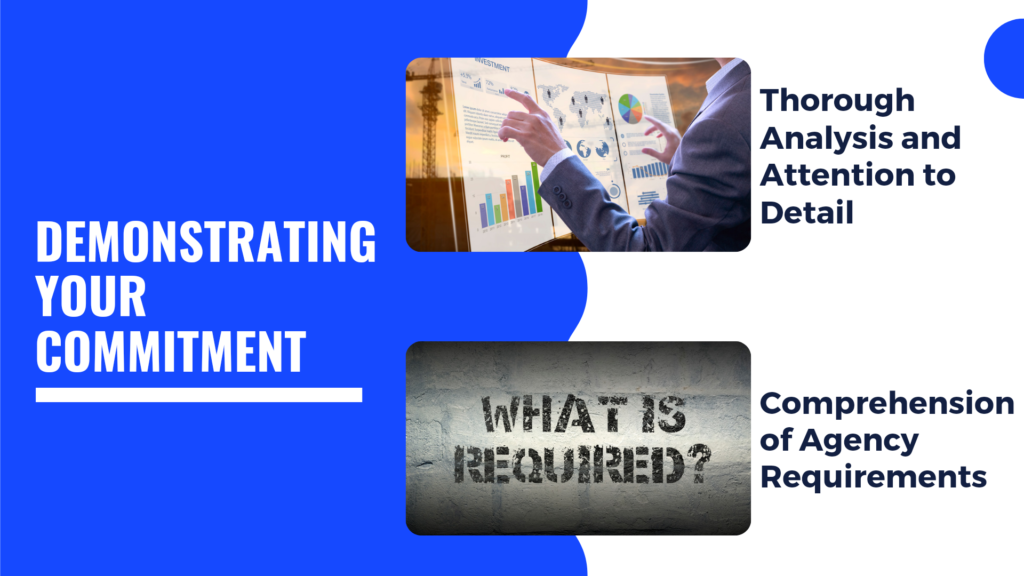Developing a competitive proposal for government contracts

Hey there, fellow entrepreneurs! Are you eager to secure government contracts for your business? Well, you’ve come to the right place! This blog post will discuss developing competitive proposals for government contracts. Don’t worry if you’re new to this process – we’ll break it down step by step, using relatable examples and providing quick tips. So, let’s get started on your path to success!
When it comes to government contracts, crafting a winning proposal is essential. The first step is to understand the requirements and objectives of the agreement. Take your time to read through the details and ask questions if anything needs. By doing so, you’ll be better equipped to tailor your proposal to meet the specific needs of the government agency.

Example:
When we say “stepping outside your comfort zones,” we mean doing things that may be scary or uncomfortable initially. It can be as simple as trying a new sport, joining a club, or even giving a presentation in front of a big audience. High achievers often try new things because they know they can learn and grow by encouraging themselves. They know that staying in their comfort zone may be safe, but it only offers a few opportunities for growth and success.

Tips for Creating a Winning Proposal:
Showcase your expertise:
Highlight your company’s strengths, qualifications, and relevant experience. Use specific examples to prove your track record of success.
Understand the evaluation criteria:
Study the evaluation criteria mentioned in the contract. Pay attention to the weighting of each standard to rank your proposal.
Tailor your solution:
Craft a resolution addressing the government agency’s needs. Focus on providing value and emphasize the benefits of your approach.

Example:
Sometimes, things go differently than planned when we step outside our comfort zones. Make mistakes or face setbacks. But here’s the secret: failure is not the end; it’s a stepping stone to success. High performers understand that failure is a part of the learning process. When they encounter obstacles, they don’t give up. Instead, they learn from their mistakes, adjust, and try again. They accept failure as a chance to grow and become more helpful for better preparation for future problems.

Another great thing about stepping outside your comfort zone is discovering hidden talents and passions. When we try new things, we may excel at something we never knew we were good at. High achievers have no hesitation in trying new things because they know it could lead them to something they love. By discovering their passions, they can focus their efforts and talents on areas that bring them joy and fulfillment.
Tips:
Create a clear project timeline demonstrating how your team will work to meet deadlines and deliver the project. This shows the agency that you have a well-structured plan.

Scenarios to Help You Relate:
Imagine you’re working on a government contract for constructing a new bridge. To better relate to the instructions, think about how different teams, such as engineers, architects, and construction workers, collaborate to bring the project to life. Each team plays a crucial role; their inaction is essential for successful completion.

Final Thoughts and Feedback:
A thorough analysis, attention to detail, and a thorough comprehension of the requirements of the agency in question are necessary when creating a competitive proposal for government contracts. By bringing your proposal, showcasing your knowledge, and working together, you increase your chances of success; this blog post has offered helpful insights and valuable advice. Feel free to leave your feedback in the comments section below. We’d love to hear about your experiences and any extra information you may have for fellow readers.

Remember, with determination and a well-crafted proposal, you can secure those government contracts and take your business to new heights! Good luck on your journey!
Isaac's Closing Questions
1. Have you personally experienced the benefits of stepping outside your comfort zone, and if so, how has it contributed to your success or personal growth?
2. What are some practical steps or strategies you can suggest for individuals who are hesitant to leave their comfort zones but want to achieve high levels of success in their endeavors?

